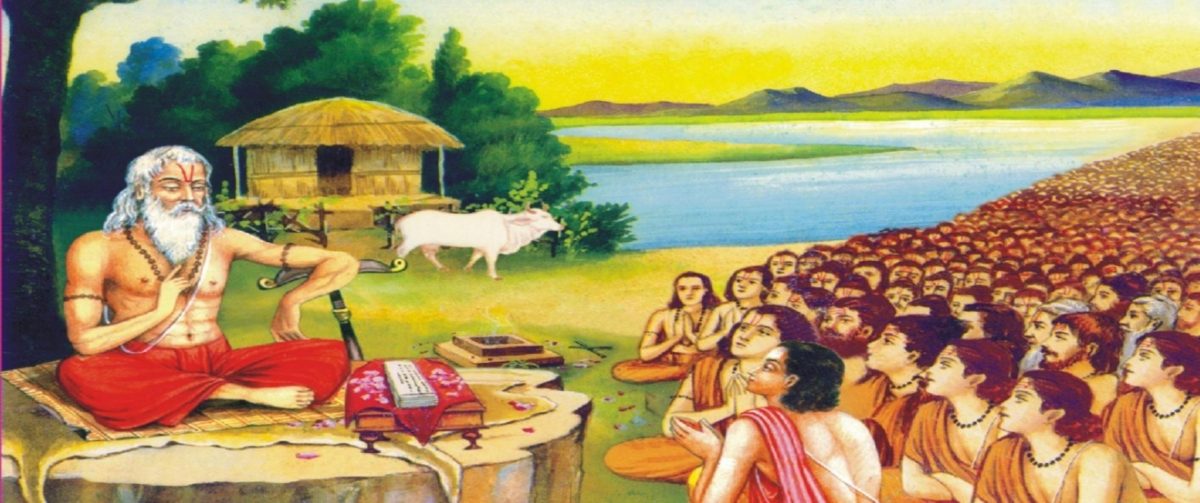Gurukul means a place where people are taken from darkness of ignorance to the light of wisdom ( Gu – darkness, Ru- Light, Kul- Residence/ place) . The Indian Gurukul system was a way of providing all round education to the students by their Guru or teacher. The disciples lived with their Guru and performed all the chores together and gained knowledge according to the need and requirement as per their role and future responsibilities in society. The knowledge of Vedas and Upanishads were imparted to all along with yoga, meditation, music, mathematics, science, philosophy etc. The Kshatriyas were taught to fight and gain mastery on weapons, the healers were taught Ayurveda, the Brahmins were taught deeper understanding of dharma, yajna, etc ., the merchants were taught business and so on. Hence the basic education being the same for all but the advanced education was based on the field.
The modern education system was introduced by British during their rule in India to suit their agendas. Modern education system is advantageous also as it introduced new languages and cultures, is more adaptive, easily accessible etc. But the Gurukul system was better than modern education system in many terms as per stated below :
All Round Development: All the students were taught the basic knowledge of almost everything. The children also performed all the chores which taught them to be independent and to be down to earth. The yoga and meditation helped them take care of their body and mind, the vedic knowledge helped them realize a greater purpose of life and know their duties well, the music and dance helped them have a passion besides work and so on. The fact that they lived with their Guru and other disciples helped them become independent and capable of adjusting in different environment from early on. Thus the Gurukul system helped in complete personality development of the child.
Excellence in Respective Field : The modern education system in India gives a basic knowledge to children in varied fields however children do not excel in one particular field and are not aware of their strengths and passions due to same syllabus with only theoretical knowledge, The Gurukul system helped children become experts in the fields opted by them and there was a better environment for development since there was no fixed curriculum and teachers were able to analyze the capabilities of students and teach them accordingly.
Practical Knowledge and Experience: The Gurukul education was practical in nature and the disciples were given firsthand experience. The disciples were encouraged to believe only what they see and experience and were taught not to believe blindly and question their teachers to be satisfied thoroughly. The modern system is just based on theoretical knowledge and the purpose is only to get good grades.
Better Environment for Young Minds: The Gurus of this system were very learned saints and thus were unperturbed by any personal sorrows or gains. They taught moral values to their disciples and were living examples of these morals. They were trained to teach and influence young minds. We, adults, nowadays be it parents or teachers are affected by our personal lives and sometimes despite our best efforts are unable to lead by example. This affects our children negatively and children are sometimes subjected to abusive environments also. If we love and pamper our children too much they become dependent or spoilt and if we are too strict the relationship with children suffers. The environment of Gurukul was neutral, unbiased, serene and perfect for nurturing children.
Sense of Equality: The children lived with other children of varied social, economical backgrounds a sense of harmony, brotherhood and equality was created among them from an early age.
No Financial Burden on Parents: There was no fees in Indian Gurukul System, only Gurudakshina was given to the Guru at the end of the education which could be in the form of some promise, or doing some work for teacher or wealth depending upon the teacher and student. Nowadays the education in good schools and institutions is too expensive and causes a huge burden on parents.
In contrary to the above advantages there are some disadvantages of this system also. Some Gurukuls gave admissions on the basis of caste and status of the children which is contradictory with the basic aim of the system but such examples are very less. The focus on girls education was less and there were only few Gurukuls for girls. The concept of co-ed education was not present. So keeping in mind the advantages and disadvantages of both the systems we can safely conclude that what we need in present times is a practical combination of both these systems where the advantages of both can be utilized and disadvantages can be minimized. What is your opinion on this matter? Please let me know in the comments section.
Apoorva Yadav Kamboj






Leave A Comment